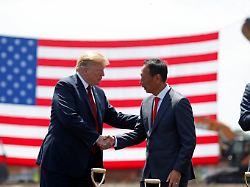Foxconn boss wants to lead Taiwan
The billionaire who claims to be able to tame China
By Max Borowski
8/30/2023, 6:44 p.m
The founder of the world’s largest electronics manufacturer wants to become President of Taiwan and defuse the conflict with the People’s Republic of China. His party friends are anything but enthusiastic about Foxconn billionaire Terry Gou’s candidacy.
Terry Gou is not a man of soft tones: “Give me four years and I guarantee that I’ll bring peace to the Taiwan Strait for the next 50 years,” the 72-year-old entrepreneur and multi-billionaire called out as he announced his candidacy at the upcoming Presidential elections for the Republic of China – Taiwan’s official name – announced. The conflict on the Taiwan Strait, which Gou “guarantees” will be resolved during his intended term as president, has kept the world in suspense for months. The leadership of the communist people’s republic has not threatened openly, as it has not done in decades, of attacking the island it claims to be part of its own state. Increased military threats underline this policy. At least since the Russian attack on Ukraine, governments from the USA to Europe to the incumbent leadership in Taiwan have taken Beijing’s threat so seriously that they are trying to reduce their economic dependency on the People’s Republic. Gou’s program is the opposite.
The founder of electronics giant Hon Hai Precision, better known around the world as Foxconn, blames not China’s increasingly authoritarian leadership for the threatening situation, but Taiwan’s ruling Democratic Progressive Party (DPP). They unnecessarily fueled the conflict with the big neighbor. He, on the other hand, wants to negotiate with Beijing again and intensify cooperation. Gou is convinced that he is in a better position to resolve the conflict than anyone else.
No one stands as much as for the economic ties between the democratic but internationally unrecognized Republic of China on the island of Taiwan and the communist People’s Republic of China. In the 1970s, with money borrowed from his mother, he bought a machine that he used to produce plastic parts for the production of black-and-white televisions. Soon he was supplying many foreign electronics manufacturers. Another growth spurt followed when Hon Hai opened its first factory in China in 1988. Within the next few decades, the group grew to become the largest electronics manufacturer in the world, which among other things produces the majority of iPhones and other Apple products sold worldwide. With well over a million employees, Hon Hai is the largest private employer in the People’s Republic.
contacts and interests
Since their country is not recognized by most states and is not a member of international organizations such as the UN, international contacts between Taiwanese politicians are severely limited. Gou, on the other hand, can point to having been received by heads of state worldwide. On the occasion of the groundbreaking ceremony for a Foxconn factory in the USA, he visited the then US President Donald Trump in the White House. Above all, however, he has personal contacts at the highest levels in Beijing.
Gou leaves no doubt that these experiences qualified him to save Taiwan “from the abyss of war” and prevent the country from becoming “a second Ukraine”. On the other hand, his critics use exactly the same connections and Gou’s investments in the People’s Republic as arguments against him. They refer to obvious conflicts of interest. Although Gou gave up day-to-day management of Hon Hai a few years ago, he is still the chairman of the board and owns a billion-dollar block of shares. In recent years, Beijing has increased pressure on international corporations to follow the official political line of the Communist Party – also with regard to the one-China doctrine, i.e. the People’s Republic’s claim to Taiwan.
“Huge Ego”
Although Gou is indeed driven by concerns about peace and stability, he would benefit financially from a rapprochement between Beijing and Taipei and deepening of economic ties. When he first announced four years ago that he would run for the presidential candidacy of the pro-China opposition party Kuomintang – with the promise of improving internal Chinese relations – the share prices of companies belonging to the Hon Hai group on the stock exchange jumped, at least briefly. Back then, Gou had already failed in the primaries.
Gou replies to critics that he would be willing to risk his fortune and would of course represent Taiwan’s interests if a corresponding conflict with Beijing actually came about. At the same time, however, he claimed that the Chinese leadership was in no position to blackmail him because he was far too important as an investor. A questionable assessment given the government’s crackdown on previously untouchable star entrepreneurs from the Chinese technology industry in recent years.
The claim to be superior even to the Chinese leadership points to another weakness that has been criticized not only by Gou’s political opponents but also in his own camp. His “huge ego” makes it “extremely difficult” to unite the fragmented opposition, the Financial Times quotes a Kuomintang representative as saying. In fact, Gou’s candidacy actually reduces the opposition’s chances. Because Gou wants to run, even though the Kuomintang – this time without primary elections – has already decided on another candidate. In addition, the popular former mayor of Taipei is running for Taiwan’s People’s Party. The victory of the DPP candidate has thus become more likely and the turnaround that Gou was aiming for in relation to the People’s Republic has moved further into the distance. Accordingly, this time the prices of the company’s own shares did not even twitch when Gou’s candidacy was announced.
